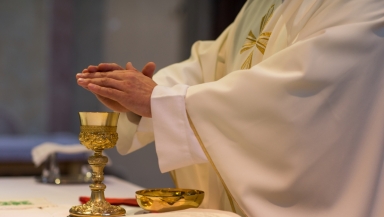
Churches must never be forced to close again, a Catholic group has said after a survey found that this had a detrimental effect on Catholic worshippers' physical and mental health.
The Catholic Union surveyed almost 1,000 people and found that for nearly two thirds (62%), their physical or mental health had been affected by the forced closure of places of worship during the pandemic.
Respondents described feelings of loneliness and depression, with one person calling it "one of the most distressing experiences of my life". Another described feeling like "a part of me was missing".
The vast majority of respondents (90%) said that if there were to be a pandemic again in the future, places of worship should be regarded as an "essential" service along with food shops and healthcare facilities.
Only a quarter thought it was necessary to forcibly close churches and other places of worship at the start of the pandemic, while most (93%) said they did not think politicians gave enough consideration to people's faith when making decisions during the pandemic.
A majority (89%) said that having different restrictions in place across different parts of the UK was unhelpful.
The results of the survey have been published in the same week as former Prime Minister Boris Johnson has been giving evidence to the UK Covid-19 Inquiry.
The Catholic Union said the findings would inform its evidence to the inquiry.
Responding to the results, Catholic Union president and crossbench peer Baroness Hollins called them "shocking" and "distressing".
"They confirm that the lockdown of churches was not only hugely unpopular, but had a real impact on people's wellbeing," she said.
"The increase in the number of people feeling lonely or depressed as a direct consequence of the closures is particularly shocking.
"It is vital that the Covid Inquiry properly considers the decisions to close and reopen churches during the pandemic.
"There is a very strong sense that faith and faith communities were pushed to one side when decisions were made, and this needs to be addressed in the learning from the inquiry. It's clear from these results that places of worship should never be forced to close again."













